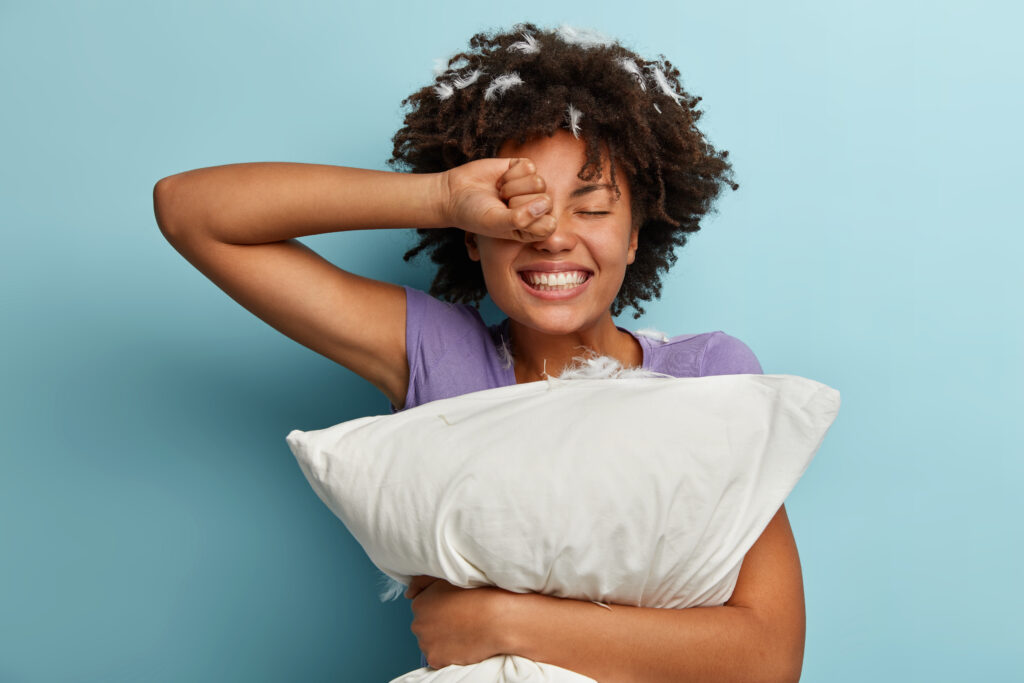Sleep Tips and Tricks
Thank you for purchasing our Sleep Honey! We created this product to support those struggling with sleep by infusing it with ingredients designed to relax the body and promote restful nights. However, we know that quality sleep isn’t achieved with just one solution—it’s the result of small, consistent habits over time. Explore different relaxation techniques and find what works best for you. Your well-rested future self will thank you
Create a Sleep-Inducing Environment
Your bedroom should be a sleep sanctuary, not a second office or entertainment zone. Keep it dark, cool, and quiet to encourage deep rest. Blackout curtains can block unwanted light, while a white noise machine or a simple fan can drown out background noise. Make sure your mattress and pillows are comfortable enough to support your body—because nothing ruins sleep faster than waking up with a stiff neck!
Bedroom Ornaments for Better Sleep
Enhance your bedroom’s sleep-friendly atmosphere by adding natural elements like a snake plant, which absorbs carbon dioxide and releases alot of oxygen in return, promoting better breathing while you sleep. For some, a fish tank can be a great addition, offering a soothing visual and auditory experience—the gentle movement of the fish and the soft bubbling of water can create a calming, sleep-inducing environment.

Stick to a Sleep Routine
Your body loves consistency, so try to go to bed and wake up at the same time every day. Yes, even on weekends! This helps regulate your internal clock, making it easier to fall asleep and wake up feeling refreshed. If you struggle to unwind at night, create a calming pre-bed ritual. Read a book, sip herbal tea, or practice deep breathing—just avoid screens, as blue light can trick your brain into staying alert.
Set a Night alarm and ditch the Morning alarm:
The problem with a morning alarm is that it snaps you out of your sleep cycle straight away instead of letting your body wake up naturally thus triggering a stress response in the body, causing a spike in heart rate and blood pressure due to the release of adrenaline and cortisol, potentially leading to feelings of agitation and disrupting sleep quality. A Nice trick for this is to not set your alarm for the morning but rather an alarm of when you need to start going to bed thus letting your body wake up Naturally and wake up the way your suppose to.
Mind What You Eat and Drink
That late-night coffee or heavy meal might be the reason you’re tossing and turning. Caffeine can stay in your system for hours, so it’s best to avoid it in the afternoon. Heavy meals before bed make your body work in digesting them thus keeping your body from relaxation. Instead eat 2 hours before sleeping to let your body digest and get into a rest state before bed.
Have a detox off certain substances:
Often, poor sleep isn’t just about stress—it’s also affected by what you consume, like alcohol and weed. While these might help you fall asleep faster, ask yourself this: do you wake up feeling truly refreshed? Probably not. That’s because, although they can make you drowsy, they interfere with REM sleep—the most vital stage for deep rest and recovery. Taking a break from these substances for at least a month can significantly improve your sleep quality. Don’t just take my word for it—give it a try and see the difference for yourself!
Try Natural Sleep Aids
If stress is keeping you up at night, try natural remedies like our Sleep Honey, chamomile tea, or a soothing blend of hot water with 2 tablespoons of apple cider vinegar and 1 tablespoon of honey. You can also stir Sleep Honey into chamomile tea or hot chocolate before bed to help your body unwind. Another option is melatonin supplements, but it’s always best to consult a healthcare professional before using them.
Get Moving During the Day
Regular exercise does wonders for sleep quality, but timing matters. Try to get at least 30 minutes of movement daily—whether it’s a brisk walk, yoga, or a full workout session. Just don’t do intense exercise too close to bedtime, as it can leave you feeling too energized to sleep. Instead, opt for relaxing evening stretches or low impact yoga to signal your body that it’s time to wind down.

Manage Stress Before Bed
A racing mind can be the biggest sleep disruptor. Journaling before bed helps you unload your thoughts onto paper instead of letting them swirl in your head. Another method is to plan for the next day ahead that way when you wake up you know what to focus on. Meditation and breathing exercises can also calm your nervous system, making it easier to relax. Try the meditation below:
Sleep Meditation:
Find a quiet, dark place where you can lie down comfortably. Close your eyes and take six deep breaths—inhaling through your nose for five seconds, holding for five, and exhaling through your mouth for six. Focus only on your breath. If your mind starts to wander, gently bring it back.
Now, return to normal breathing and spend one minute simply listening to the sounds around you—no need to name them, just notice them. Next, shift your focus to touch—feel the bed beneath you, the blankets on your skin, and the clothes you’re wearing.
Then, bring your attention to your body, starting with your right thumb. Breathe into each part as you move through your fingers, up your arm, down your hip, through your thigh, and down to your toes. Repeat the same sequence on your left side. Finally, focus on your abdomen, chest, lower and upper back, neck, and face—breathing into each area from your mouth and cheeks to your ears, eyes, and nose.
If your mind drifts, gently return to the body part you were on. By now, you should feel deeply relaxed—or already asleep.
Reduce Screen Time at Night
Scrolling through social media or watching TV before bed can seriously mess with your sleep. The blue light from screens interferes with melatonin production, the hormone responsible for making you sleepy. Try switching to a book, listening to soothing music, or dimming the lights an hour before bed. If you must use your phone, turn on night mode to minimize blue light exposure. To minimize blue light on your computer download the free app below:
Keep Your Bedroom Clutter-Free
Believe it or not, a messy room can contribute to stress and restlessness. A tidy, organized space promotes relaxation and a sense of calm. Keep your bed free of distractions like work papers or electronic devices, and use soft, neutral colors to create a soothing atmosphere.
Listen to Your Body
Some people thrive on eight hours of sleep, while others feel great with six or seven. Pay attention to how you feel in the morning and adjust accordingly. If you’re constantly waking up groggy, it may be time to tweak your bedtime habits or sleep schedule. If you did not sleep well the night before, you need to pay that debt of the time lost else it carries over to the next day .To do this have a 20-30min nap during the day or go to bed a bit early. This way your body gets the recovery it needs. Your body knows what it needs—just listen to it!

Conclusion
A good night’s sleep is one of the most powerful ways to boost your health, mood, and energy levels. By creating a sleep-friendly environment, maintaining a consistent routine, and being mindful of what you consume, you can significantly improve your sleep quality. Small lifestyle changes, like reducing screen time, managing stress, and incorporating natural sleep aids, can make all the difference.
Sleep Honey is a simple yet effective addition to your nighttime routine, helping you relax and ease into restful sleep. When combined with healthy sleep habits, it can support your body in getting the deep, restorative rest it needs. Prioritize your sleep, experiment with these techniques, and enjoy waking up feeling refreshed and rejuvenated. Sweet dreams!






